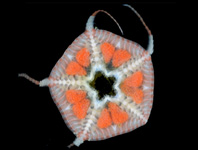Abstract
Astrophiura caroleae, new species, is described from off Curacao in the southern Caribbean, and from the western Gulf of Mexico, in depths of 244 to 434 meters. This new species, the first in the genus Astrophiura to be described from the Atlantic Ocean, has a distinctive combination of characters, including regularly arranged primary plates, large radial shields whose radial edges are in contact for their entire visible length, and prominent tubercles on central and radial plates. The mottled reddish coloration of the dorsal surface of this species usually contrasts with the color of the substratum, rendering it readily visible in situ, despite its disc diameter of less than 10 mm. Like its congeners, A. caroleae is gonochoric, the gonads of females containing conspicuous masses of bright orange eggs that are approximately 165 µm in diameter. DNA Barcoding data are provided for this new species, these are the first for Astrophiura.
References
Baranova, Z.I. (1955) New species and subspecies of echinoderms (Echinodermata) from the Bering Sea. Trudy Zoological Institut Akademia NAUK SSSR, 18, 334–332. [in Russian]
Clark, H.L. (1923) The echinoderm fauna of South Africa. Annals of the South African Museum, 13, 221–435.
D’yakonov, A.M. (1954) Ophiuroids of the USSR seas. Zoological Institute of the Academy of Sciences of the USSR, Moskva, 131 pp. [in Russian]
Fujita, T. & Hendler, G. (2001) Description of the new species of Astrophiura (Echinodermata: Ophiuroidea) from Tosa Bay, Japan, and several of its remarkable anatomical characteristics. In: Fujita, T., Saito, H. & Takeda, M. (Eds.), Deep-sea fauna and pollutants in Tosa Bay. National Science Museum Monographs, 20, pp. 263–281.
Geller, J., Meyer, C., Parker, M. & Hawk, H. (2013) Redesign of PCR primers for mitochondrial cytochrome c oxidase subunit 1 for marine invertebrates and application in all-taxa biotic surveys. Molecular Ecology Resources, 13/5, 851–861.
https://doi.org/10.1111/1755-0998.12138Hugall, A.F., O’Hara, T.D., Hunjan, S., Nilsen, R. & Moussali, A. (2015) An exon-capture system for the entire class Ophiuroidea. Molecular Biology and Evolution, 33/1, 281–294.
https://doi.org/10.1101/014613Koehler, R. (1915) Description d’une nouvelle espéce d’Astrophiura, l’Astrophiura Cavellae. Bulletin Institut Oceanographique Monaco, 311, 1–15.
Knowlton, N., Brainard, R.E., Fisher, R., Moews, M., Plaisance, L. & Caley, M. J. (2010) Coral reef biodiversity. In: McIntyre, A.D. (Ed.), Life in the World’s Oceans. Blackwell, Oxford, pp. 65–78.
https://doi.org/10.1002/9781444325508.ch4Laguarda-Figueras, A., Solís-Marín, F.A., Durán-González, A., Ahearn, C.G., Buitrón Sánchez, B.E. & Torres-Vega, J. (2005) Equinodermos (Echinodermata) del Caribe Mexicano. Revista de Biología Tropical, 53/3, 110–122.
Litvinova, N.M. & Smirnov, I.S. (1981) A contribution to studying the genus Astrophiura (Echinodermata, Ophiuroidea). Zoologichesky Zhurnal, 60/4, 626–629.
Matsumoto, H. (1917) A monograph of Japanese Ophiuroidea, arranged according to a new classification. Journal of the College of Science, Imperial University of Tokyo, 38, 1–407.
Meyer, C. (2003) Molecular systematic of cowries (Gastropoda: Cypraeidae) and diversification patterns in the tropics. Biological Journal of the Linnaean Society, 79, 401–459.
https://doi.org/10.1046/j.1095-8312.2003.00197.xNg, P.K.L. & Meyer, C. (2016) A new species of pea crab of the genus Serenotheres Ahyong & Ng, 2005 (Crustacea, Brachyura, Pinnotheridae) from the date mussel Leiosolenus Carpenter, 1857 (Mollusca, Bivalvia, Mytilidae, Lithophaginae) from the Solomon Islands. Zookeys, 623, 31–41.
https://doi.org/10.3897/zookeys.623.10272O’Hara, T.D. (2017) Class Ophiuroidea. In: Byrne, M. & O’Hara, T.D. (Eds.), Australian echinoderms: biology, ecology, and evolution. CSIRO Publishing, Melbourne & ABRS, Canberra, pp. 295–350.
O’Hara, T., Hugall, A.F., Thuy, B., Stöhr, S. & Martynov, A.V. (2017) Restructuring higher taxonomy using broad-scale phylogenomics: the living Ophiuroidea. Molecular Biology and Evolution, 107, 415–430.
https://doi.org/10.1016/j.ympev.2016.12.006Sladen, W.P. (1878) On Astrophiura permira, an echinoderm-form intermediate between Ophiuroidea and Asteroidea. Proceedings of the Royal Society of London, 27, 456–457.
https://doi.org/10.1098/rspl.1878.0083Sladen, W.P. (1879) On the structure of Astrophiura, a new and aberrant genus of Echinodermata. Annals and Magazine of Natural History, Series 5, 4, 401–415.
Stöhr, S. & Martynov, A.V. (2016) Paedomorphosis as an evolutionary driving force: insights from deep-sea brittle stars. PLoS one, 11/11, e0164562.
https://doi.org/10.1371/journal.pone.0164562Stöhr, S., Sabyasachi, S. & Ingole, B. (2012) Brittle stars (Echinodermata: Ophiuroidea) from seamounts in the Andaman sea (Indian Ocean)—a first account, with descriptions of new species. Journal of the Marine Biological Association of the United Kingdom, 92/5, 1195–1208.
https://doi.org/10.1017/S0025315412000240Stöhr, S. O’Hara, T. & Thuy, B. (Eds.) (2017) World Ophiuroidea Database. Available from: http://www.marinespecies.org/ophiuroidea (accessed 22 December 2017)
Vadon, C. (1990) Ontogénèse du genre Astrophiura Sladen (Echinodermata, Ophiuroidea) et rehabilitation de la familie des Astrophiuridae Sladen. In: De Ridder, C., Dubois, P., Lahaye, M.-C. & Jangoux, M. (Eds.), Echinoderm Research; Proceedings of the Second European Conference on Echinoderms, Brussels, Belgium, 18–21 September 1989. A.A. Balkema, Rotterdam, pp. 341.
Ziesenhenne, F.C. (1951) A new brittle star of the genus Astrophiura from southern California. Bulletin of the Southern California Academy of Sciences, 50/1, 25–33.

